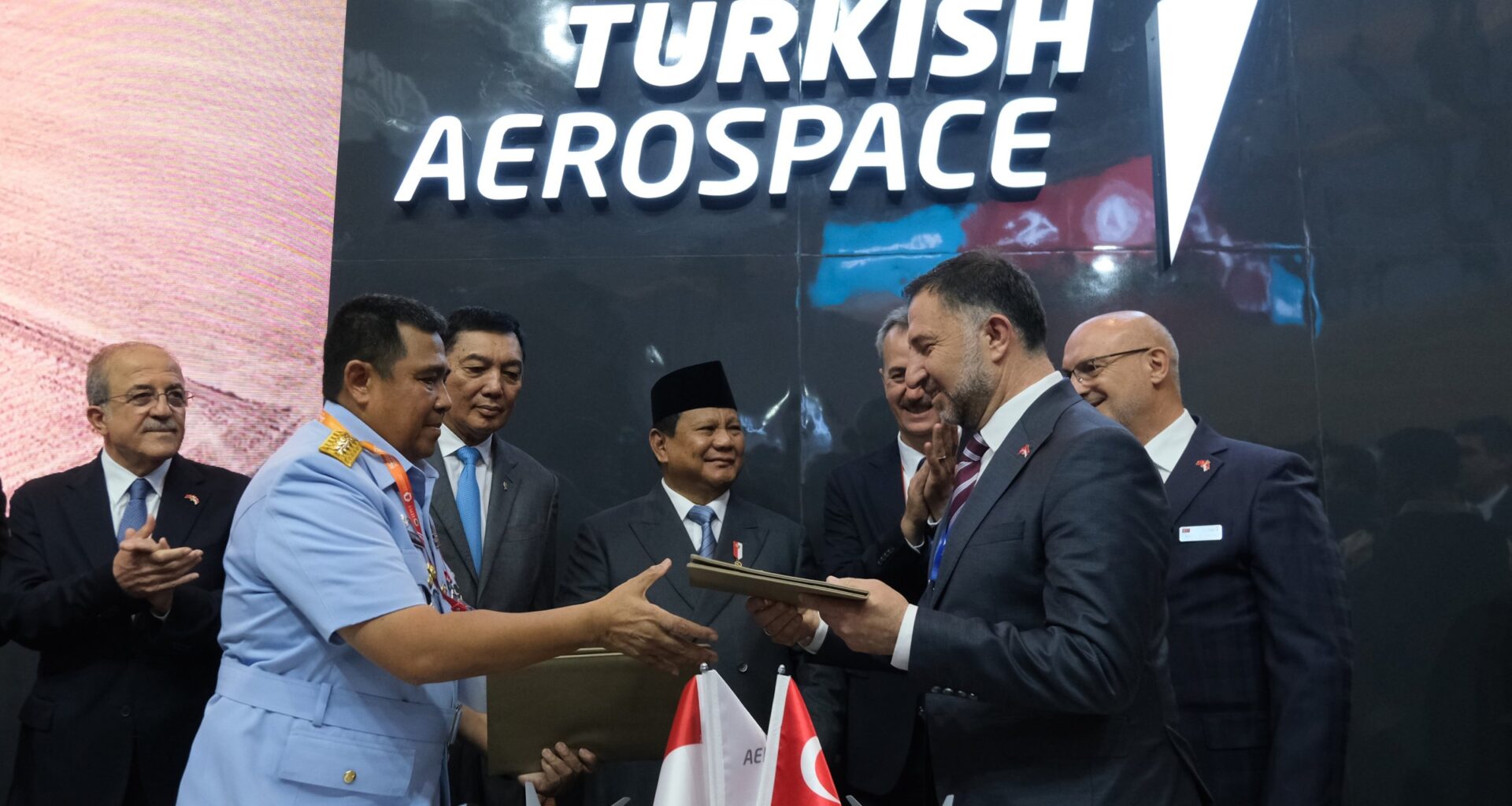Indonesia and Türkiye have been deepening their defense relations, particularly highlighted by recent agreements and purchases. This can be seen with formal partnerships like annual Defense Industry Cooperation Meetings since 2012 and recent high-level visits in 2025, such as President Recep Tayyip Erdoğan’s visit to Indonesia in February and Indonesian President Prabowo Subianto’s trip to Türkiye in April. It seems likely this is a move to address future challenges collectively, especially reducing Indonesia’s dependence on traditional Western suppliers.
Purchase of KAAN fighter jets
In February 2025, Indonesia purchased 60 TB3 and nine Akıncı drones from Türkiye’s Baykar as part of the deal signed during President Erdoğan’s visit. Later on June 11, the Turkish president announced that Türkiye will export 48 KAAN fifth-generation fighter jets to Indonesia, which is still under development by Turkish Aerospace Industries (TAI), marking the first international sale of this advanced aircraft. The deal, signed at the Indo Defence 2025 exposition in Jakarta, includes production in Türkiye with integration of Indonesia’s local capabilities and technology transfer, with deliveries planned over 10 years. Because of the $10 billion agreement, Erdoğan hailed Subianto for playing a key role, marking it as a milestone for Türkiye’s defense industry. These recent arrangements mark a significant development in Indonesia and Türkiye’s relations.
The strategic partnership addresses Indonesia’s pressing defense needs and aligns with Indonesian Law No. 16/2012, which mandates local content and technology transfer in defense procurement. Indonesian companies will co-produce drones and missile systems with Turkish firms, which are considered to be the key to providing Indonesia with the critical expertise and infrastructure needed, thus enabling the development of indigenous capabilities and ensuring long-term self-sufficiency.
Indonesia’s MEF targets
Initiated in 2007 by the Yudhoyono administration, Indonesia’s Minimum Essential Force (MEF) policy aimed to achieve 100% modernization of Indonesia’s alutsista (main weaponry system) targets. The MEF includes specific targets for each branch of the armed forces to procure and develop indigenous weapons systems. However, as the deadline approached in early 2024, it became apparent that only about 65% of the MEF had been achieved, forcing a strategic evaluation of Indonesia’s defense posture.
This procurement gap likely influenced Indonesia’s decision to seek partnerships with a trusted partner like Türkiye, a strategic choice to reinforce defense capabilities. The decision was praised by some defense analysts, not making Indonesia heavily reliant on a handful of defense suppliers. It is in line with a broader strategy to diversify defense suppliers and enhance capabilities, especially given the need to address regional security challenges, including transnational crime, maritime security, and the ever-present terrorism potential in the region.
In light of the MEF shortfall, these purchases were criticized as a “patchwork” solution to reinforce Indonesia’s defense posture. But every partnership toward fulfilling the policy mandates is seen as a welcome approach. At the same time, a joint venture with firms like Baykar and Republikorp, established for manufacturing, assembly and maintenance, indicates a long-term strategy to integrate these capabilities into Indonesia’s defense framework.
Technology transfer, indigenous development
Another critical aspect of this strategic cooperation is the technology transfer. Looking at the joint venture with Republikorp for drone production suggests it’s a step toward building a more indigenous drone system. A recent push for indigenous drone systems is becoming a top priority, especially after trialing the Elang Laut and Wulung drones, supporting Indonesia’s defense posture. Further, recent agreements within the last two years include the transfer of advanced defense technologies, such as air defense systems and missiles, with Turkish firms like Aselsan and Roketsan involved in providing systems like the remote-controlled weapon systems and anti-ship missiles.
This agreement includes the participation of Indonesian engineers and technicians in training programs aimed at improving local production capabilities. The partnership aligns with Indonesia’s strategy to reduce reliance on Western arms through technology transfer and local defense industry development. This strategic move is vowed to strengthen Indonesia’s domestic defense sector through technology transfer and a joint production initiative.
What next?
Although Türkiye is not Indonesia’s largest defense partner by quantity, its deepening relations, particularly in terms of technology transfer and joint manufacturing in the production of several series of weaponry systems, position Türkiye as a key partner. Still, questions remain whether this cooperation will be sustainable, considering past setbacks like Indonesia’s unresolved participation in the KF-21 fighter jet project (a joint initiative between South Korea and Indonesia, started in 2015), in which Jakarta has been unable to finalize its part of the deal.
The failure to fully realize MEF has exposed the fragmented nature of Indonesia’s defense procurement, often purchasing defense equipment that lacks operational capability. A key concern is the lack of coordination in the procurement of defense equipment from multiple suppliers. Which led to the ultimate question, as far as interoperability concerns, can the armed forces operate drones purchased from Türkiye along with existing MiG or F-16 fighter jets?
Despite these issues, recent agreements and the strategic alignment with Türkiye suggest that this cooperation will continue to deepen, supporting Indonesia’s defense modernization and Türkiye’s ambition to become a major arms exporter in Southeast Asia.

